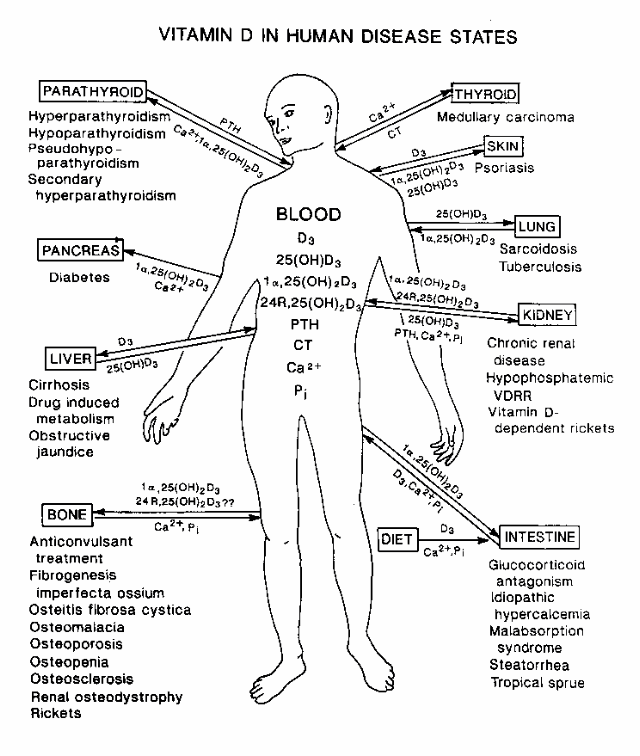Vitamin D as a Seasonal Stress Hormone
Vitamin D as A Kind of “Seasonal Stress Hormone,” Chronobiological Stress Hormones.
 The benefits that a person can draw from vitamin D are too much to be listed. We know that one of the reasons that make people bask in the sun is to help in the synthesis of this crucial vitamin. Without this vitamin there are several ailments that a person is bound to suffer from. Basic knowledge of vitamin D is that it helps in strengthening bones of teeth but it has far more benefits that many people have never known of, one of its many benefits is that it is a chronobiological Stress Hormone
The benefits that a person can draw from vitamin D are too much to be listed. We know that one of the reasons that make people bask in the sun is to help in the synthesis of this crucial vitamin. Without this vitamin there are several ailments that a person is bound to suffer from. Basic knowledge of vitamin D is that it helps in strengthening bones of teeth but it has far more benefits that many people have never known of, one of its many benefits is that it is a chronobiological Stress Hormone
Vitamin D as a Chronobiological Stress Hormone
If you haven’t taken to basking in the sun seriously, it is time you need to begin doing so for as Alexander Wunsch has it, vitamin D is a kind of “seasonal stress hormone,” explaining that chronobiological stress hormones such as adrenocorticotropic hormone (ACTH), and adrenaline-cortisol hormone blends are what enable you to get up in the morning, and help regulate the blood sugar concentration in your body, just to name a couple of their functions. According to Wunsch, Vitamin D has greater importance that if the sun would stop shining then very many creatures will lose life.
the sun should shine but we have summer and winter among other crucial seasons, in these seasons the body ought to balance the thermal energy so as to ensure optimal health, during the summer the main focus of the body is to concentrate on cooling down the system while during the winter the focus of the body is to concentrate on heating the system. Therefore it is prudent for a person to bask in the sun during the summer, laying naked in the sun as that’s the best way to get more of the light, digest enough of the energy that is eventually is transformed into thermal energy.
As it has been taught, learnt and rehearsed, vitamin D has very vital functions for our health. There is need for this crucial hormone to ensure that our systems perform optimally. Our bodies are dependent on this crucial vitamin that is sourced from nature’s shine. The need for this crucial vitamin can’t be erased by the fact that some of us are not fortunate enough to live in areas where there is perpetual sunshine but are rather barred by cold weather from getting adequate sun exposure. it is therefore required of people in this areas to eat foods that are rich in Vitamin D to help in its supplementation but whenever there is a slight chance to bask in the sun, the chance should be utilized as the sun is the best source of vitamin D. in other scenarios when the lack of this vitamin may cause to even bigger health risks, it is advisable for the victim to seek Sun therapy.
Heliotherapy
Heliotherapy is a better idea to help equip the body impoverished of vitamin D. heliotherapy involves exposing oneself to sunlight or UV light from sources which are safe. exposure to sunlight may expose you to risk of skin cancer as have been taught but the intensity that cause cancer is rarely actualized, therefore it is prudent to say that the benefits that you can draw from basking in the sun far outweighs the risks. In the past before the risk of cancer began scaring us, the sun therapy was already being used to treat such diseases as rickets, tuberculosis and other diseases caused by vitamin D deficiency. Risk or no risk we need to accept the reality that we need sun at certain dosages and levels to ensure that our systems are working efficiently without flaws.
 There is something that many people have never known; your capillaries are modified under the sun and that the skin is linked to the autonomic nervous system, vitamin D is also a seasonal stress hormone popularly known as a chronobiological stress hormone. This is a phenomenon that needs no rocket science to be proven; if you are keen you will realize that after basking in the sun your stress levels go down and this is not the only benefit, there is more you will gain when you look far beyond the UVB portion of the spectrum. The UVB helps in synthesis of vitamin D.
There is something that many people have never known; your capillaries are modified under the sun and that the skin is linked to the autonomic nervous system, vitamin D is also a seasonal stress hormone popularly known as a chronobiological stress hormone. This is a phenomenon that needs no rocket science to be proven; if you are keen you will realize that after basking in the sun your stress levels go down and this is not the only benefit, there is more you will gain when you look far beyond the UVB portion of the spectrum. The UVB helps in synthesis of vitamin D.
According to Wunsch the sun is a life giver; “We all should be aware of the fact that when the sun was to stop shining, nothing would be alive in two or three days on this planet,” Wunsch says.
“When we are eating, we are eating transformed light. We can prove this scientifically, as you know. I think even if we are not able to estimate the influence light has on our biological system as a whole, it starts on the single cell level and it ends in our consciousness, in our mental functions. Light is a symbol in our culture, which will always be our companion.” he concludes
From what we have gathered in research findings and the massive research work by Alexander wunsch we can conclude that vitamin D is a crucial part of our health and is also a therapy for seasonal stress. Basking in the sun helps relieve stress and therefore there is lots of reason in concluding that vitamin D, the sunshine hormone is seasonal stress hormone that everybody should consider supplementing.
Vitamin D as A Kind of “Seasonal Stress Hormone,” Chronobiological Stress Hormones.











 Christmas diet fad myths debunked
Christmas diet fad myths debunked Obesity in America: Safe Rapid weight loss, Obesity is preventable
Obesity in America: Safe Rapid weight loss, Obesity is preventable






 Eczema Diagnosis and Treatment for a glowing skin
Eczema Diagnosis and Treatment for a glowing skin

 Hot flushes
Hot flushes





